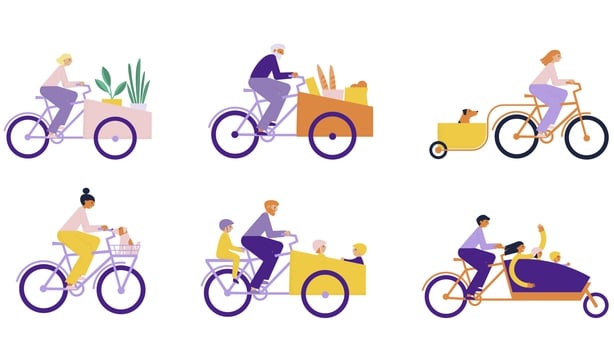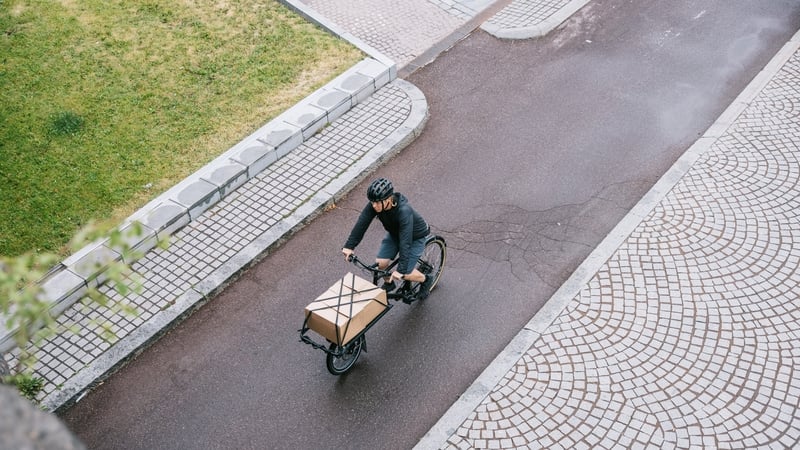Analysis: Residents in five European cities highly support the introduction of sustainable cargo bike delivery services
By Sabrina Zhang, TU Dublin and River H. Huang, Paul Scherrer Institute Switzerland
Booming e-commerce and on-demand freight deliveries in cities has brought huge changes in people’s consumption behaviours and delivery patterns. Urban shipments have become smaller and more fragmented, resulting in increasing direct delivery trips to home destinations. The last-mile delivery disrupts life in the city, causing environmental and social concerns such as air pollution, noise, congestion and road safety issues.
Cargo bikes have become a popular urban freight transport mode for businesses to deliver goods in Ireland and other European countries. Based on a Cycling Industries Europe survey, France and Germany account for the largest number of cargo bike operators, with the Netherlands, Spain, Belgium, UK, Italy, Norway, and Hungary following. It is reported that sales of cargo bikes increased to 112,429 in 2022 from 2021, a 36.3% increase. Additionally, employment climbed by 25.8% during the same year.
We need your consent to load this YouTube contentWe use YouTube to manage extra content that can set cookies on your device and collect data about your activity. Please review their details and accept them to load the content.Manage Preferences
From Vox, why it's time to replace urban delivery vans with safer and cleaner e-cargo bikes
Cargo bikes and last-mile delivery
Generally speaking, a cargo bike is a faster and cleaner option for last-mile delivery in urban areas. A study from the University of Westminster suggested that cargo bike delivers 60% faster than vans, with 90% less carbon emissions compared with diesel vans.
Electric cargo bikes can reduce carbon emissions and air pollution (such as particulate matter and nitrogen oxide) by 30% - 55% per package compared to fossil fuel vehicles. Cargo bikes are quieter than motorcycles or mopeds, with an average of 50-60 dB of noise produced (like a humming refrigerator or dishwasher), making freight delivery operations less disruptive to residents and businesses in urban areas. Given their compact size, use of cargo bikes can also reduce congestion in cities and we anticipate a 75% reduction in the road space required for the cargo bike fleet compared to a normal car.
We need your consent to load this rte-player contentWe use rte-player to manage extra content that can set cookies on your device and collect data about your activity. Please review their details and accept them to load the content.Manage Preferences
From RTÉ News, report on the e-cargo bike pilot scheme for small business in Dún Laoghaire-Rathdown in 2021
Given the slower operational speeds (maximum of 25 km/h) and reduced number of delivery vans blocking the city, we can predict a reduction in the number and severity of traffic accidents related to deliveries in the city. With a commitment to offer fair jobs and safer working conditions for e-cargo bike riders, customers may expect a slight 10 to 20% increase in the delivery fee compared to traditional delivery services.
We surveyed 2,030 people (47% females with a mean age of 37) in London, Paris, Rome, Dublin and Warsaw from Novemer 2023 to January 2024 to learn about their preferences for cargo-bike delivery services in European cities. We chose these cities as capital cities are varied in their urban 'freightscape’ in terms of population and employment densities. Here are three things we learned.
Environmental impact
Citizens in all five European capital cities highly supported the introduction of cargo bike delivery services, demonstrating a growing demand for environmentally friendly last-mile delivery solutions. Our survey findings show a consistently high overall satisfaction level from citizens with the cargo bike service. This result suggests that citizens in all five capital cities value environmentally sustainable last-mile delivery options, a finding also in a Norwegian study which showed consumers now care about the environmental impacts of the last-mile delivery they generated.

Higher shipping costs
The higher shipping costs associated with the cargo bike service are a concern for most of the surveyed participants. It's evident from our survey analysis that the delivery cost for sustainable cargo bike delivery services remains a shared concern across all five cities. This finding provides a more nuanced understanding of consumer's willingness-to-pay for an alternative last-mile delivery service across different cities. This finding could also suggest a need for market research and a strategic value proposition for the pricing structure.
Different sustainability priorities
Reducing carbon emissions as a sustainable goal is supported by citizens of all cities, but it was not the top priority universally. Participants from different cities have different sustainability priorities when it comes to sustainable last-mile delivery services. For example, those in Warsaw, Rome and suburban London focus on reducing carbon emissions and see cargo bike service as a valuable transport mode for decarbonisation.
But for those in urban London and Dublin, where traffic is perceived as a significant problem, citizens believe that the cargo bike service could effectively ease the traffic congestion. In Paris and Warsaw, the focus is on noise reduction with citizens hoping to reduce noise pollution by choosing cargo bike delivery services.
We need your consent to load this YouTube contentWe use YouTube to manage extra content that can set cookies on your device and collect data about your activity. Please review their details and accept them to load the content.Manage Preferences
What's it like to deliver giant pizzas on a cargo bike in London on a Friday night?
While sustainability preferences differ among cities, road safety is a universally high-demand criterion. This is challenging, indicating a need for targeted strategies to address safety concerns for cargo bike riders and other road users.
In conclusion, our survey analysis provides new insights into citizens’ attitudes and preferences for cargo bike delivery services as an alternative and popular last-mile delivery. These findings could help city managers and logistics practitioners gain a more nuanced view of their community and neighbourhood, thus offering tailored policies and market propositions to address citizens’ needs.
This article is based on an ongoing study by the authors.
Follow RTÉ Brainstorm on WhatsApp and Instagram for more stories and updates
Dr Sabrina Zhang is a researcher in the School of Transport and Civil Engineering at TU Dublin specialising in urban logistics and sustainability assessment. Dr. River H. Huang is a scientist at the Paul Scherrer Institute Switzerland, specialising in multi-criteria decision-making and optimisation.
The views expressed here are those of the author and do not represent or reflect the views of RTÉ

